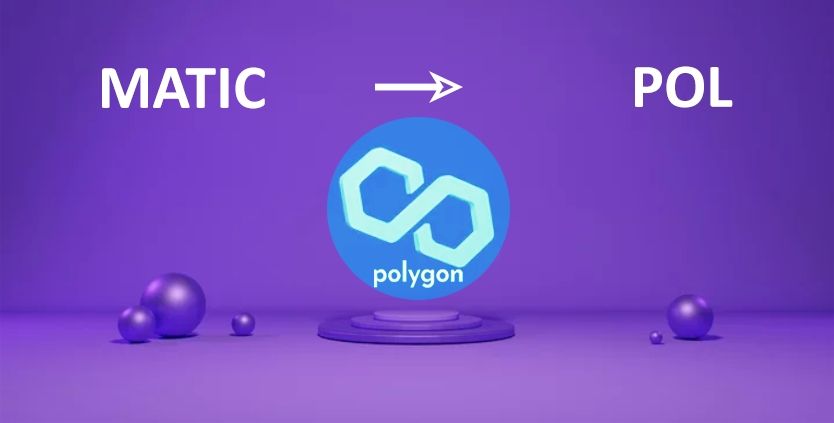The MATIC token of the network would be replaced with POL in a token upgrade proposed by a group of Polygon founders and researchers, enabling POL to serve as a single token for all Polygon-based networks.
The primary Polygon blockchain, the Polygon zkEVM network, and various supernets—application-specific blockchains that sit atop the primary Polygon network—are among these networks.
In the first three minutes following the announcement, MATIC increased by as much as 2.6% to $0.747 thanks to the proposal.
Network validators will be able to support the operation of multiple chains using a single token if the proposal is approved.
Sending MATIC to the upgrade smart contract, which will instantly return the equivalent amount of POL, is the only technical action needed to upgrade from MATIC to POL. If the community is in favor of the change, token holders would be given plenty of time to upgrade—a suggested four years or more.
The community of each Polygon chain will ultimately decide which token will be used for gas fees; some of them may choose POL. All rewards will be distributed in POL, and holders will use POL to vote on governance proposals for decentralized applications built on Polygon.
Enhanced Utility And Use Cases

The primary objective of the MATIC-to-POL token switch is to provide users with a more versatile and feature-rich token. The POL token is expected to offer a broader range of use cases, catering to the diverse needs of developers and users on the Polygon network. With enhanced utility, POL tokens are poised to become a more valuable asset within the blockchain ecosystem.
Improved Tokenomics And Governance

Polygon recognizes the importance of a robust governance model to ensure community participation and inclusivity. The switch to POL tokens will bring an upgraded tokenomics structure, granting holders increased governance rights. This upgrade empowers stakeholders to actively participate in decision-making processes, driving the platform’s evolution through community-driven initiatives.
Increasing Scalability And Interoperability

Polygon has been a trailblazer in facilitating seamless interoperability between different blockchain networks. By transitioning to POL tokens, the platform aims to enhance its cross-chain compatibility, making it more appealing to developers and projects from various ecosystems. The increased interoperability will foster collaboration and accelerate the adoption of decentralized applications (dApps) across multiple chains.
Faster Transactions And Lower Transaction Costs
Polygon is committed to delivering an optimal user experience. The switch to POL tokens is expected to optimize the network, resulting in reduced transaction fees and faster confirmation times. Lower fees make it more cost-effective for users to engage in transactions and interact with dApps, further bolstering the network’s appeal.
Fueling Ecosystem Growth
With the upgrade to POL tokens, Polygon anticipates attracting a broader and more engaged community of developers and projects. The enhanced utility and governance features are set to incentivize greater innovation and investment in the platform. This ecosystem growth will strengthen Polygon’s position as a leading scaling solution in the blockchain space.
Conclusion
Polygon’s proposal to switch from MATIC to POL tokens represents a forward-thinking initiative to further elevate its platform’s utility and scalability. By upgrading its token and governance model, Polygon aims to create an even more robust and developer-friendly ecosystem. The proposed MATIC-to-POL token switch is expected to attract a diverse community of stakeholders, drive innovation, and cement Polygon’s position as a prominent scaling solution in the blockchain space.
FAQs
Q. When will the MATIC-to-POL token switch take place?
A. The timeline for the MATIC-to-POL token switch is subject to community consensus and regulatory considerations. Polygon’s development team is actively working on the proposal, and further updates will be shared with the community as the process unfolds.
Q. How will the token swap be conducted for MATIC holders?
A. Details regarding the token swap mechanics and conversion ratios for MATIC holders are yet to be released. Polygon is expected to provide clear instructions and guidelines on how users can participate in the swap to seamlessly transition their MATIC tokens to POL tokens.
Q. Will the token switch affect the functionality of existing MATIC tokens?
A. During the transition phase, existing MATIC tokens will continue to function as usual. However, users should stay updated on the switch’s progress to ensure a smooth migration to the new POL token once it is implemented.
Q. Will exchanges support the MATIC-to-POL token swap?
A. Most major cryptocurrency exchanges are likely to support the MATIC-to-POL token swap to ensure a smooth transition for their users. However, it is advisable to check with individual exchanges for specific details and announcements related to the token switch.
Q. Can users continue staking MATIC tokens after the switch?
A. Users who have staked MATIC tokens can expect to retain their staked positions during the transition to POL tokens. The switch is not expected to impact existing staking arrangements, but users should seek official updates from Polygon for any changes in staking mechanisms.











